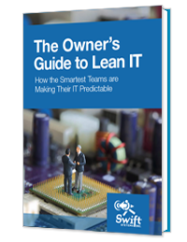
5 Ways Technology Should Be Working for Your Business
There are two sides to everything – including tech’s benefit to business.
On the one hand, it’s really difficult to imagine how businesses functioned before the IT systems and cutting-edge tech we have today. Can you picture a modern service business without smart phones? A doctor’s office without digital data? A manufacturing floor without mission-critical automated tech?
Technology has become essential to pretty much every component of every process in every business. And it allows us to do things at a level of efficiency that we barely could have imagined 20 years ago.
Of course, there’s another side to that coin, too. Technology is essential – which means when it breaks, havoc happens. Systems shut down and businesses can’t function. All of that efficiency can quickly go up in smoke.
So it’s important to stay on the right side of the coin – the side that capitalizes on IT benefits and avoids IT disasters. Technology’s ubiquity means that one of the key drivers to business success is making technology work for you.
Here’s how that should happen.
1. Your technology should keep your data safe
Along with the rise in technology has come a rise in cybercrime. Unless you’ve stayed off the grid for the past two decades, you know the headlines: Target, Ebay, HBO, Equifax, Atlanta – all hacked, with tons of financial and reputational losses along the way.
Below the headlines, though, there’s also brimming industry focused around smaller attacks. About 70% of cybercrime is actually targeted toward SMBs. That’s because these targets often don’t have the same security measures in place that the bigger companies employ. For hackers, the payoff may be smaller, but the job is a whole lot easier.
Your business is at risk. But your technology can help.
Make protecting your network, your mission-critical systems, and your data a top priority by choosing an IT provider with expertise in cybersecurity.
2. Your technology should speed up your business’s processes.
The phrase “optimize your business processes” is a prime example of jargon – but it’s also the bottom-line function that technology should have in your organization.
Your technology should make your business’s processes easier and faster. That plays out differently across organizations and industries. In health, it may mean enabling more efficient data access, while in manufacturing it may mean streamlining aspects of the production line with automation.
The end result of your business’s technology usage should always be more efficient processes.
3. Your technology should empower your business’s communication.
Your communication could probably fall into a subset of your business’s processes, but our take is that it’s important and broad enough to expand upon.
That’s because one of technology’s main impacts has been on the way we communicate.
We now have the ability to get in touch with almost anyone, at almost any time, in almost any location. You can work remotely and easily video chat with a colleague in the office across town – or with a contact on the other side of the world. With email, could-based apps, social media platforms, texting, and more, there’s an ever-increasing breadth of channels to empower your business’s communication, both internally and with customers.
Of course, relying on tech to communicate carries the risk of chaos when things go down. If you’ve ever struggled to connect to an important conference call or had emails misfire due to network problems, you know the sinking feeling that technology issues cause.
That’s why it’s essential that your technology empowers your business to communicate – and that you’re not constantly scrambling to overcome technology issues and radio silence.
4. Your technology should build your brand.
This is a bit of a softer point, but it’s an important one: your technology should add to your brand, not detract from it.
There are many ways this plays out. For instance, I was recently in the office of a doctor who was using what looked like an early 2000s PC at his workstation – it was one of those big, ugly, boxy machines that looked like a small step up from an abacus. Honestly, the doctor could have said anything; my perception of his competency, fairly or not, had already been decided in the wrong direction.
In almost any industry, cutting-edge technology and efficient usage of tech in customer interactions says a lot about a brand. If you have old technology or constant IT issues, your customers will notice.
Make sure your technology is building your brand, not undercutting it.
5. Your technology should minimize your stress – not add to it.
Finally, a word of common sense: your technology should make your life easier, not harder.
Too often, there’s the perception that business technology systems are just one more thing to be managed. IT is a cost center – a source of problems, not of solutions. Businesses shouldn’t have to function that way.
You shouldn’t have to live that way.
Technology should work for you. So, work with an IT provider that minimizes your stress.
Put Your Technology to Work for You with IT You Can Count On
Is your technology working for your business by keeping your data safe, speeding up your processes, empowering your communications, building your brand, and making your life easier?
If it’s not, it’s time for a change. If you’re tired of technology issues, it’s time to choose a new IT provider.
At Swift Systems, we’ve seen firsthand how the unreliability of low-cost IT solutions impacts businesses like yours, crippling their productivity and burdening them with unpredictable costs. It’s a sad reversal of the way technology is meant to function: as a tool to help your business thrive.
Want your technology to work for you in the way you need it to, without nagging IT issues? Let’s talk.

IT systems are foundational to modern businesses. Too often, that foundation is unsteady. Unpredictable outages, insecure networks, and unreliable performance from mission-critical systems can jeopardize your entire business.
There’s a better way. Learn how.
Get in touch with us for a free consultation with one of our technical experts. We’ll review your current systems, assess your needs, and identify the coverage options to best meet them.
Get in touch with us by phone:


